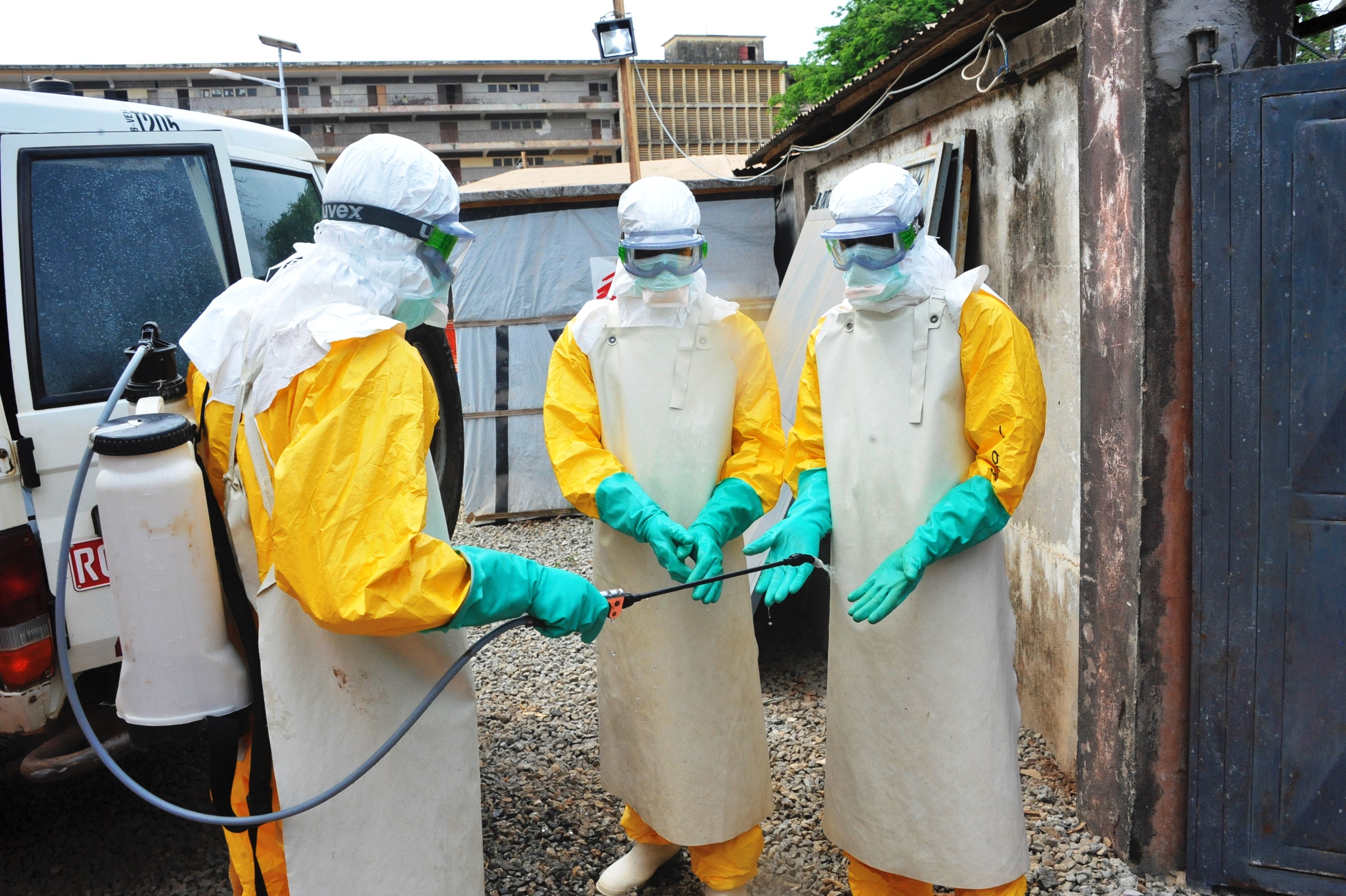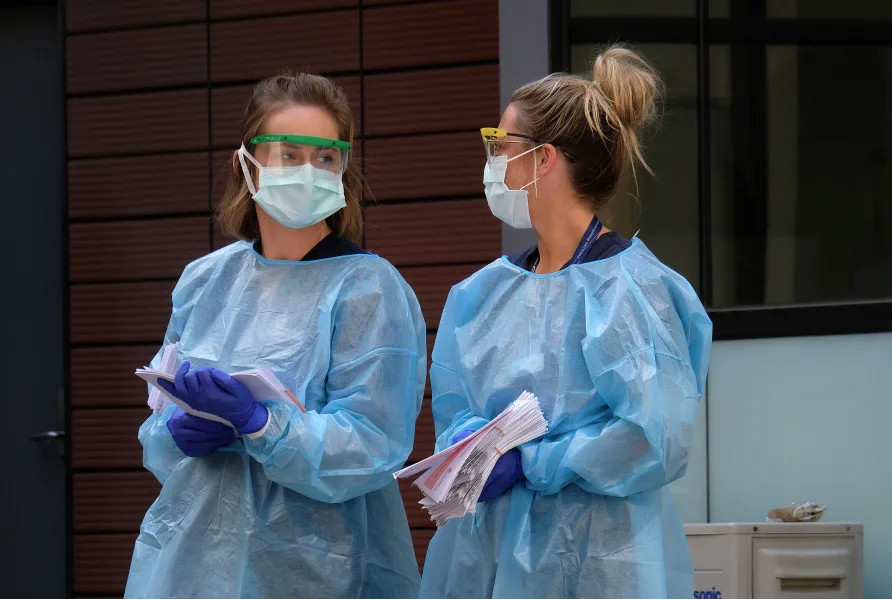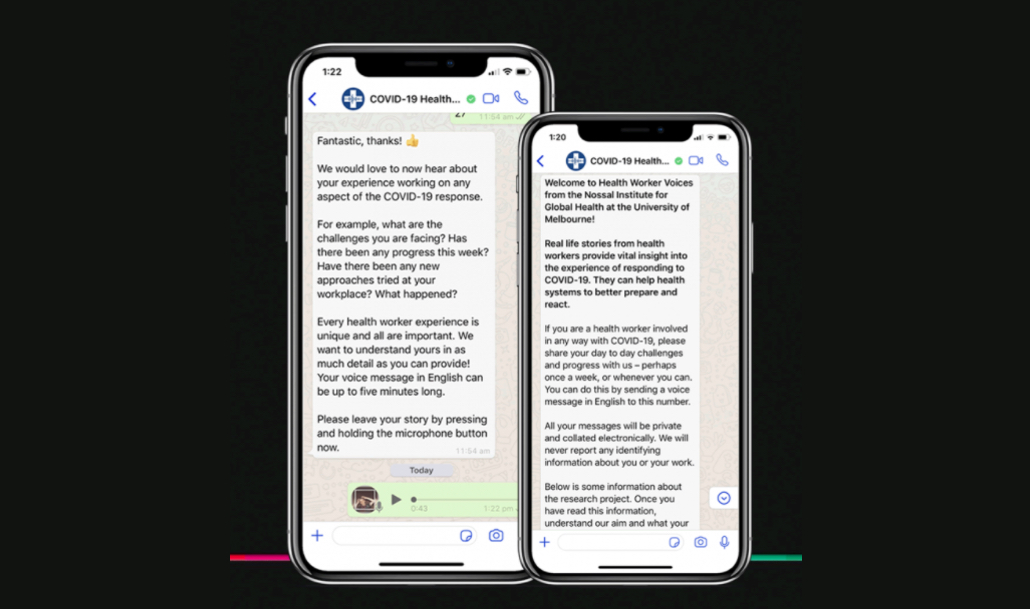
Gathering lessons from COVID-19 health workers as they happen

Voice memos from health workers are being confidentially collected to capture their experience of the pandemic, boost the future preparedness of health systems and support workers
Published 24 August 2020
The West African Ebola pandemic demonstrated how challenging it is to capture health systems lessons from health workers during a crisis.
Health workers are incredibly busy, focused on their patients and other compelling priorities.

But when they can be captured, insights from health workers - deeply centred as they are in their specific operational and cultural context - can be hugely valuable to the review and development of effective strategies that support health workers themselves and health care delivery before, during and after epidemics.

For instance, while health workers generally appreciate the need to look after their own health to enable their care of others, anticipating the specific challenges of working during an epidemic may aid their preparation.
For example, during the Ebola outbreak in Sierra Leone health workers noted the particular mental strain that comes from the unavoidable rationing of care in resource poor settings.
Health workers also emphasised the need to appreciate the social and historical context of health and care seeking, and that local knowledge and traditions can be a powerful platform for mobilising support for the epidemic response.
This led to collaborations between staff at Ebola Treatment Centres (ETCs), local leaders and community members that demystified the ETCs from places full of foreigners in plastic boiler suits that took locals away to die, to important (though still intimidating) places where they could receive critical care.

Following the devastation of health systems in West Africa from Ebola, calls have increased to capture insights from health workers to inform efforts to boost the preparedness and responses of health systems, both now and in the future. It is vital we do this during COVID-19.

Health & Medicine
The world needs nurses now more than ever
In early April, the ABC’s Four Corners program presented the testimony of a range of health workers as they reflected on the challenges of COVID-19.
Drawing on video diaries, the documentary highlighted the various emotional challenges of their work, exhaustion from wearing personal protective equipment for long periods of time, worries over the public’s ability and willingness to adhere to social distancing protocols, and the considerable mental toll from being isolated from loved ones.
The rich, human experience of these workers provided complex, real-time insight into the challenges they faced, and how they have and wished they could respond.
What if health worker stories about their health system’s response to COVID-19 could be captured over time, across country settings and for the many different types of health workers including clinicians, non-clinicians, those in facilities and the community? What if tens, hundreds or even thousands of such stories could be collected?

Then these stories could be analysed by country, type of worker and the theme of response and key lessons collated and reported. All this is now possible without over-burdening health workers at a time of intense work pressure.

Business & Economics
How are Australia’s doctors faring during COVID-19?
A WhatsApp channel called COVID-19 Health Worker Voices has this month been launched to collect voice memos from health workers in Australia and around the world, throughout the course of the pandemic.
Led by the Nossal Institute for Global Health at the University of Melbourne, with the support of researchers in the Melbourne eResearch Group, the channel enables health workers to link to a private WhatsApp chat on a smartphone.
Participants simply press the microphone button and share stories of their health system’s response to COVID-19. The data set will not be available to anyone but the researchers.
The aim is to capture stories of challenge and innovation as the needs and capacities of health systems evolve during the current crisis, as well as in subsequent phases of the pandemic which may for instance see a rise in lockdown-related issues amongst other continuing needs and concerns.

By its nature, the content captured will be self-directed and representative of what is important, indeed front-of-mind, for health workers at that specific point. Data from these stories will be analysed for both retrospective evaluation purposes and to inform work to boost the future preparedness of health systems, including support to health workers.

Health & Medicine
Dealing with COVID-19 in aged care
The hope is that the sharing of stories may also be cathartic for health workers during a pressured time, which will no doubt look different across countries and contexts.
WhatsApp is a widely popular and trusted digital social platform, owing to its user friendly and intuitive interface, and encryption of data at both sender and recipient ends. It has the third highest number of active users globally behind Facebook and YouTube.
Once WhatsApp is installed on a user’s smartphone, the COVID-19 Health Worker Voices channel aims to be intuitive within its simple user interface. Audio files will be automatically transcribed using software sensitive to English spoken with a wide range of accents. The hope is that the channel will soon be translated into other languages to enable an even broader reach.

The project is based on a partnership between the Nossal Institute for Global Health and the School of Computing and Information Systems both at the University of Melbourne, Amazon Web Services (AWS) and Twilio.
With ethical approval from the University of Melbourne, the project will pool the stories health workers contribute and utilise innovative analytical approaches that draw on automation and artificial intelligence (AI) and more traditional qualitative approaches.

Health & Medicine
As a health worker, what’s my risk from COVID-19?
Previously AI has been utilised in the analysis of large scale qualitative datasets for market research and to predict electoral trends, so this project offers a new utlilisation of AI with more philanthropic aims.
The project also aims to include workers from minority groups who are often reportedly excluded from AI analyses.
The project will specifically appraise the capacity of the AI analytics to explore the testimony of health workers from minority groups based on simple, demographic characteristics shared by respondents.
Findings from the project will be regularly reported on the Nossal Institute’s COVID-19 Health Worker Voices webpage and on Twitter @HWvoices.
Health workers can get involved by opening this link on their smartphone and by forwarding it on to others: https://bit.ly/COVID-19HWVoices. Text ‘hello’ to get started and follow the prompts from there. Our ‘How to’ film can also help users if they get stuck!
Questions or comments on the Health Worker Voices project can be emailed to: covid-19hwvoices@unimelb.edu.au
Banner: Getty Images


